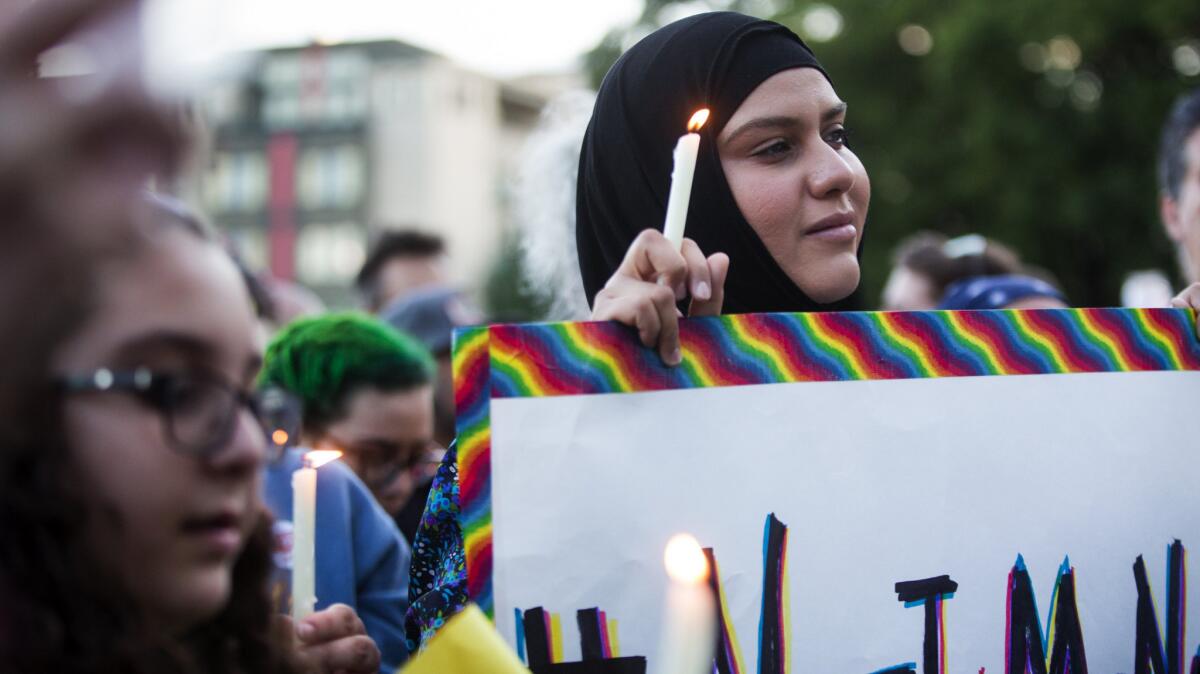Op-Ed: GOP’s new tactic: pitting the LGBT community against Muslims

In 2002 the Dutch politician Pim Fortuyn carved a path for Donald Trump. Fortuyn demanded an end to Muslim immigration, claiming that Islamic culture endangered the Dutch tradition of respect for LGBT rights. I remember reading the headlines after Fortuyn’s party won local elections, wondering how long it would be until America’s political right adopted the same tactic. The answer was 14 years.
Last week in Cleveland, Republican grandees cited protecting LGBT Americans as a central reason for vigilance about Islam. Newt Gingrich said, “If our enemies had their way, gays, lesbians and transgender citizens would be put to death as they are today in the Islamic State and Iran.” Trump himself pledged to “do everything in my power to protect our LGBT citizens from the violence and oppression of a hateful foreign ideology.”
Pitting LGBT rights against Islam appears to be the GOP’s strategy for transitioning away from overt homophobia. Only ten years ago the party agitated for a constitutional amendment banning gay marriage. Now, with thousands of ordinary Republicans attending the same-sex weddings of their own children, the party must change.
A turning point came in June, after a man declaring his allegiance to Islamic State killed 49 people at a gay nightclub in Orlando. Within hours Gingrich was telling Fox News that he wants LGBT people to “realize that Islamic supremacy is their mortal enemy.” Two days later, Trump tweeted, “Thank you to the LGBT community! I will fight for you while Hillary brings in more people that will threaten your freedoms and beliefs.”
This is the script that Fortuyn wrote: Muslims must be kept out because they are a threat to gay rights. Some Republicans will insist that the comparison is an unfair one. Unlike Fortuyn, they wish to stop only “radical Islamists.” But their nominee does not take this distinction seriously. Trump has repeatedly proposed a ban on all Muslim entry to the United States. The day after the Orlando attack, he told a rally, “We cannot continue to allow thousands upon thousands of people to pour into our country — many of whom have the same thought process as this savage killer.”
Preventing violent murder is a very low standard for caring about a group’s pursuit of happiness or equal rights.
There is one real difference between Fortuyn and the Trumpists: Fortuyn was entirely sincere. He was an openly gay man at a time when the Netherlands was the only country in the world that recognized full marriage rights for gays and lesbians. He seems to have genuinely believed that Muslim immigrants would fail to respect Dutch tolerance. Fortuyn was dangerously wrong about Muslims, but he wasn’t feigning concern for a community he didn’t really care about.
That is not true of Trump’s Republican Party, which approved “the most anti-LGBT platform” in the party’s history, according to Gregory T. Angelo, leader of the Log Cabin Republicans. It seeks to overturn the Supreme Court’s marriage equality decision. In coded language, it insists that parents have the right to subject LGBT children to “conversion therapy,” an unscientific practice condemned by the Southern Poverty Law Center as “worse than snake oil.”
Last year Mike Pence, the governor of Indiana and Trump’s choice for vice president, signed a law explicitly permitting economic discrimination against LGBT people, which became a model for viciously anti-gay laws in North Carolina and elsewhere.
Unlike Fortuyn, Trump’s GOP does not deeply care about the rights of LGBT people. No doubt Gingrich means it when he says he wants to protect gay people from execution at the hands of Islamic State. But preventing violent murder is a very low standard for caring about a group’s pursuit of happiness or equal rights.
Instead, the Trumpist embrace of Fortuyn’s script is a cynical exploitation of the vulnerability of one group in order to marginalize another vulnerable group. Nearly all Muslims pose no risk to LGBT Americans – nor to any other American. Thousands of American Muslims have LGBT family, or are gay themselves. But the GOP enters the general election by bashing together two of its sharper edges – the party’s hostility to LGBT people and Trump’s Islamophobic mania – and hoping the result is gentle enough for moderates.
Fortuyn never saw his anti-Muslim agenda enacted. He was assassinated in May 2002. (His killer was not a Muslim.) But in Dutch politics his message is still carried by Geert Wilders, who calls Islam “the Trojan horse of Europe.” This week Wilders was in Cleveland, as a featured speaker at a “gays for Trump” party. There he called on America to stop distinguishing radical Islam from the rest of the religion. “Islam is the problem,” he claimed.
Fourteen years after Fortuyn’s moment, LGBT rights in the Netherlands are stronger than ever. Across Europe, the Muslim population grew by five million, while 12 more countries began recognizing marriage equality. In 2014, before the Supreme Court’s ruling, four of the five US states with the largest Muslim populations already allowed gays and lesbians to marry. Fortuyn was wrong: in Europe as in America, Islam and LGBT rights can grow together.
Regina Rini is assistant professor of bioethics at New York University.
Follow the Opinion section on Twitter @latimesopinion or Facebook
More to Read
A cure for the common opinion
Get thought-provoking perspectives with our weekly newsletter.
You may occasionally receive promotional content from the Los Angeles Times.










